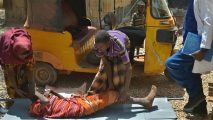Privacy Overview
This website uses cookies so that we can provide you with the best user experience possible. Cookie information is stored in your browser and performs functions such as recognising you when you return to our website and helping our team to understand which sections of the website you find most interesting and useful.


















21, January 2020
Battle For Ambazonia: SDF in turmoil as local elections approach 0
The opposition Social Democratic Front (SDF), destabilised by the mass exodus of its militants, most of whom have become the target of separatist militias, is divided over its participation in the local elections of 9 February.
With close to 40 members held hostage and three cadres’ residences torched, the SDF is suffering the full brunt of reprisals by armed militias operating in English-speaking regions. These militias continue to target those participating in the electoral process, initiated by President Paul Biya at the end of 2019. In the run-up to the February legislative and municipal elections, the SDF’s electoral strategy is causing divisions within the party.
In the North-West and South-West regions, strongholds of the SDF, members of the leading opposition party (in terms of the number of members elected to parliament) are being targeted by the militias, who have openly called for their “neutralisation” since the publication of the candidate lists, which are now closed. As a sign of the extent of the danger, John Fru Ndi, president of the SDF, was forced to abandon his residence in Bamenda and take refuge in Yaoundé “because of numerous death threats”.
While Biya’s historic challenger has often claimed he would be “ready to die in Bamenda if need be”, the aftermath of his last abduction in late June, which forces him to travel regularly to the United States for treatment, seems to have changed his mind.
Fear of further defeat
Within the SDF, the issue of participation in the February local elections is divisive. A fringe of the party, mostly comprising the remaining grassroots in the English-speaking regions, openly opposes involvement in the process. For them, the wounds the last presidential election — in which the SDF conceded a historic defeat by finishing fourth, a first since its creation in 1990 — are raw, and fears of a new setback are uppermost in their minds.
Before leaving Cameroon on 11 January, Fru Ndi reaffirmed his party would take part in the elections.
“The SDF has never had an easy election in Cameroon. We have even often had to win elections, and then we were beaten up and had our victory stolen. But we are competing because we want to let the world know that we are ready for these elections,” he told the press.
Differing opinions
According to internal sources, the SDF’s participation in the elections is a foregone conclusion, although Fru Ndi does not rule out a possible withdrawal from the race.
“If these elections are not held in safe conditions, we will cancel our participation,” he said. “We have until February to see what the situation is on the ground and draw conclusions,” said Joshua Osih, who took the reins of the party in the absence of the chairman.
Several withdrawals
However, on the ground, supporters of the boycott have already thrown in the towel. In Bamenda, Batibo, Bafut, and Bali, announcements of the withdrawal of the SDF candidates have been made one after the other and have provoked numerous comments.
Awabeng Daniel Babila, a former candidate for municipal elections in Bali, chose to resign, saying, “I have lost loved ones in this crisis. I was advised not to run, which I did. I am no longer a member of the SDF nor of any political party.”
These cascading withdrawals could seriously threaten the SDF’s chances — already weakened — in the February elections. Unlike the 2013 local elections, in which the party presented 103 candidates, only 61 candidates were registered for the upcoming polls.
Source: The Africa Report